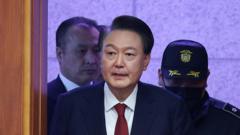Ko Wen-je, a former presidential candidate and Taipei mayor, has been indicted on corruption charges involving bribes and campaign finance misreporting, casting a shadow over his political movement and triggering protests from supporters.
Taiwan's Ko Wen-je Faces Corruption Charges in Political Turmoil

Taiwan's Ko Wen-je Faces Corruption Charges in Political Turmoil
Former presidential candidate Ko Wen-je indicted for bribery and campaign finance violations as protests erupt.
Ko Wen-je, the former presidential candidate who emerged as a surprise contender in Taiwan’s recent elections, was indicted on Thursday in connection with serious corruption allegations. The 65-year-old politician stands accused of accepting bribes totaling approximately half a million dollars tied to a real estate transaction during his time as mayor of Taipei. He is also facing accusations of misreporting campaign finances from his presidential run in January.
The prosecutors are aiming for a sentence as long as 28.5 years in prison. This indictment marks a significant setback for the political movement that Ko has championed, which resonated with voters searching for a viable alternative to the ruling Democratic Progressive Party (DPP) and the principal opposition party, the Kuomintang (KMT).
Denouncing the allegations, Ko has been in detention since his arrest in September. Prosecutors indicated that he is one of 11 individuals facing prosecution, with several other members of his Taiwan People’s Party also implicated in misappropriating political donations.
Despite finishing third in the January presidential election, where he gained over 25% of the vote compared to Lai Ching-te's 40%, observers noted that Ko's performance reflected a growing appetite among voters for a more diverse political scene beyond the traditional two-party dominance. Ko has consistently positioned himself as a third choice, critiquing the DPP for its aggressive approach towards Beijing and the KMT for being overly compliant.
Rising to fame after his support of the 2014 anti-Beijing Sunflower Movement, Ko first became Taipei’s mayor as an independent and won re-election in 2018. However, there has been a noticeable shift in his political stance, fostering closer ties with mainland China.
Notorious for his unconventional style and outspoken remarks, Ko is regarded as a maverick in Taiwanese politics and has often been labeled a "gaffe machine." After his recent electoral defeat, he had pledged to keep fighting for political office, eyeing a potential presidential bid in 2028 despite the unprecedented wave of legal challenges facing him and his party.
The gravity of Ko’s arrest has incited backlash among his supporters and political allies, who accuse the DPP of weaponizing the legal system to stifle political adversaries. As Taiwan navigates this turbulent political landscape, Ko Wen-je remains a pivotal figure whose future ambitions now hang in the balance.
The prosecutors are aiming for a sentence as long as 28.5 years in prison. This indictment marks a significant setback for the political movement that Ko has championed, which resonated with voters searching for a viable alternative to the ruling Democratic Progressive Party (DPP) and the principal opposition party, the Kuomintang (KMT).
Denouncing the allegations, Ko has been in detention since his arrest in September. Prosecutors indicated that he is one of 11 individuals facing prosecution, with several other members of his Taiwan People’s Party also implicated in misappropriating political donations.
Despite finishing third in the January presidential election, where he gained over 25% of the vote compared to Lai Ching-te's 40%, observers noted that Ko's performance reflected a growing appetite among voters for a more diverse political scene beyond the traditional two-party dominance. Ko has consistently positioned himself as a third choice, critiquing the DPP for its aggressive approach towards Beijing and the KMT for being overly compliant.
Rising to fame after his support of the 2014 anti-Beijing Sunflower Movement, Ko first became Taipei’s mayor as an independent and won re-election in 2018. However, there has been a noticeable shift in his political stance, fostering closer ties with mainland China.
Notorious for his unconventional style and outspoken remarks, Ko is regarded as a maverick in Taiwanese politics and has often been labeled a "gaffe machine." After his recent electoral defeat, he had pledged to keep fighting for political office, eyeing a potential presidential bid in 2028 despite the unprecedented wave of legal challenges facing him and his party.
The gravity of Ko’s arrest has incited backlash among his supporters and political allies, who accuse the DPP of weaponizing the legal system to stifle political adversaries. As Taiwan navigates this turbulent political landscape, Ko Wen-je remains a pivotal figure whose future ambitions now hang in the balance.




















